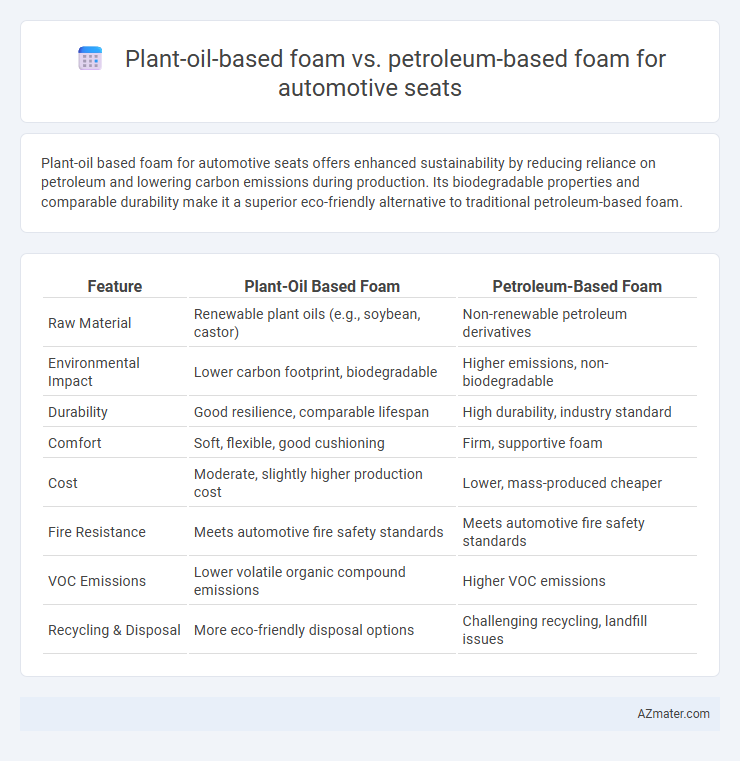Plant-oil based foam for automotive seats offers enhanced sustainability by reducing reliance on petroleum and lowering carbon emissions during production. Its biodegradable properties and comparable durability make it a superior eco-friendly alternative to traditional petroleum-based foam.
Table of Comparison
| Feature | Plant-Oil Based Foam | Petroleum-Based Foam |
|---|---|---|
| Raw Material | Renewable plant oils (e.g., soybean, castor) | Non-renewable petroleum derivatives |
| Environmental Impact | Lower carbon footprint, biodegradable | Higher emissions, non-biodegradable |
| Durability | Good resilience, comparable lifespan | High durability, industry standard |
| Comfort | Soft, flexible, good cushioning | Firm, supportive foam |
| Cost | Moderate, slightly higher production cost | Lower, mass-produced cheaper |
| Fire Resistance | Meets automotive fire safety standards | Meets automotive fire safety standards |
| VOC Emissions | Lower volatile organic compound emissions | Higher VOC emissions |
| Recycling & Disposal | More eco-friendly disposal options | Challenging recycling, landfill issues |
Introduction to Automotive Seat Foams
Plant-oil based foams for automotive seats offer enhanced sustainability through renewable resources, reducing reliance on traditional petroleum-based foams derived from fossil fuels. These bio-based foams provide comparable comfort, durability, and cushioning performance while supporting lower carbon emissions in vehicle manufacturing. Adoption of plant-oil foams aligns with increasing automotive industry standards for eco-friendly materials and improved occupant safety.
What Is Plant-Oil Based Foam?
Plant-oil based foam for automotive seats is a sustainable alternative derived from natural oils such as soy, castor, or palm oil, which replace traditional petroleum-based polyols in the foam formulation. This foam offers similar durability, comfort, and performance while significantly reducing dependency on fossil fuels and lowering the carbon footprint of vehicle interiors. Its biodegradable properties and renewable feedstock contribute to enhanced environmental benefits compared to conventional petroleum-based foam.
Overview of Petroleum-Based Foam
Petroleum-based foam, commonly used in automotive seats, is derived from petrochemical processes involving crude oil refinement. It offers high durability, excellent cushioning, and cost-effectiveness, making it a standard choice in vehicle interiors. However, its environmental impact includes non-biodegradability and reliance on finite fossil fuel resources, driving interest in sustainable alternatives like plant-oil based foams.
Environmental Impact Comparison
Plant-oil based foam for automotive seats significantly reduces carbon emissions by utilizing renewable resources, lowering reliance on fossil fuels compared to conventional petroleum-based foam. It offers enhanced biodegradability and decreased environmental pollution during production and disposal phases, contributing to reduced ecological footprints in automotive manufacturing. Lifecycle analyses highlight that plant-oil foams contribute to lower greenhouse gas emissions and improved sustainability metrics, aligning with global efforts to minimize automotive industry environmental impacts.
Performance and Durability Differences
Plant-oil based foam for automotive seats offers enhanced breathability and improved vibration absorption compared to petroleum-based foam, resulting in increased passenger comfort. Petroleum-based foam typically provides higher initial resilience and structural rigidity, contributing to better long-term seat shape retention under heavy use. However, plant-oil foam exhibits superior resistance to microbial growth and biodegradation, extending seat durability in humid environments.
Cost Implications in Manufacturing
Plant-oil based foam offers potentially lower raw material costs due to renewable resources, though initial investment in supply chain adjustments can increase upfront expenses. Petroleum-based foam benefits from established production infrastructure, resulting in consistent pricing but higher volatility linked to fossil fuel markets. Long-term manufacturing cost trends favor plant-oil foams through improved sustainability incentives and reduced regulatory risks.
Comfort and Ergonomics Evaluation
Plant-oil based foam used in automotive seats demonstrates enhanced breathability and improved cushioning properties, leading to superior comfort compared to traditional petroleum-based foam. Ergonomic evaluations reveal that plant-oil foam adapts more effectively to body contours, reducing pressure points and promoting better posture during extended driving periods. Furthermore, the sustainable composition of plant-oil foam contributes to reduced VOC emissions, enhancing the overall in-cabin air quality and occupant wellbeing.
Safety and Regulatory Considerations
Plant-oil-based foams for automotive seats exhibit enhanced safety profiles due to lower flammability and reduced toxic gas emissions during combustion, meeting increasingly stringent regulatory standards such as FMVSS 302 in the US and ECE R118 in Europe. These bio-based foams contribute to improved indoor air quality by emitting fewer volatile organic compounds (VOCs), aligning with global environmental regulations and consumer health concerns. Compliance with evolving safety and environmental mandates drives automakers' shift towards plant-oil foams, promoting sustainable innovation while ensuring occupant protection.
Adoption Trends in the Automotive Industry
Plant-oil based foam is gaining traction in the automotive industry due to increasing environmental regulations and consumer demand for sustainable materials, with adoption rates rising by approximately 15% annually since 2020. Major automakers such as BMW, Ford, and Toyota have integrated bio-based foams into seat manufacturing to reduce carbon footprints and improve life cycle assessments. In contrast, petroleum-based foam remains prevalent but faces declining use due to volatile oil prices and stricter emission standards targeting volatile organic compounds and greenhouse gases.
Future Outlook: Sustainable Solutions for Automotive Seating
Plant-oil based foam offers a promising future for automotive seating by significantly reducing carbon footprint and reliance on fossil fuels compared to petroleum-based foam. Innovations in bio-based polyols derived from renewable resources enhance durability and comfort standards while meeting stringent automotive industry regulations. Growing consumer demand for eco-friendly vehicles and tightening environmental policies drive the adoption of sustainable, plant-oil based foams in seat manufacturing, positioning them as a key solution for greener automotive interiors.

Infographic: Plant-oil based foam vs Petroleum-based foam for Automotive seat
 azmater.com
azmater.com